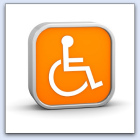
People with disabilities often feel isolated from the world going on around them, whether injured in a motor vehicle or industrial accident, experiencing a debilitating condition resulting from a disease, or born with a birth defect. Rehabilitation counseling is the link between someone with a disabling condition and everyday functioning in the world.
When someone is disabled, they need help overcoming certain barriers. The goal of rehabilitation counseling is to help these individuals overcome these barriers, assessing abilities and needs, setting goals, and helping them overcome physical, social, and emotional obstacles.
Rehabilitation counseling encompasses every disabling situation, and works with every type of disability, including behavioral and emotional disabilities, disabilities caused by war, and those resulting from conditions such as muscular dystrophy, cerebral palsy, and Down syndrome.
Counseling involves a wide range of treatments, from evaluation, to in-hospital therapy, out-patient treatment, and establishing processes and aids for living independently. In some cases, rehabilitation counseling lasts a week or a month; in other cases the process continues for several years.
Rehabilitation Counseling as a Process
Rehabilitation counseling is often referred to as a process because of the many facets involved for an individual to become self-reliant.
The process begins with a series of consultations. Interviews are conducted with the disabled individual, and with his or her family. Rehabilitation counselors review and evaluate medical reports, any relevant school reports, and psychometric test results. Consultations are held with the patient’s psychologist, physicians, and other therapists who have been, or will need to be, involved. This includes occupational therapists, physical therapists and speech therapists, depending on the condition.
Rehabilitation counselors are also trained in referring patients to other therapists, and consulting with physicians and other health care providers. The goal of these consultations is to assess capabilities in order to develop a rehabilitation program. Sometimes mental health counseling must take place before rehabilitation counseling can begin. Teachers and employers are also brought into the discussion.
Rehabilitation counseling takes place in various settings as the process of rehabilitation progresses. Some counselors specialize in certain settings, such as inpatient care or home-based care. However, the counseling process generally begins in a hospital or other clinical setting. Counseling typically then moves to outpatient facilities, rehabilitation clinics, private offices, homes, and into a school or workplace.
Assistive Technology in Rehabilitation Counseling

A wide range of assistive—or adaptive—technologies are available in our modern society to help people with disabilities as they strive to live independently. Assistive technology, or AT as it is commonly referred to in rehabilitation counseling, is any technology or piece of equipment used by people with disabilities to perform tasks that might not otherwise be possible.
Setting Goals
Once the initial consultations are complete and the counselor, along with any involved physicians and family members, has an understanding of the patient’s condition and potential limitations, goals are established.
Goals are physical, such as being able to walk or climb stairs, or helping an individual find an accessible route to his or her job, the grocery store, doctor’s offices, and churches. They might involve helping individuals find suitable jobs, teaching them how to manage all the physical requirements of a job, or how to live independently in their own house or apartment.
Technological adaptations might require counselors to help individuals and their families adapt to prosthetic limbs, electric wheelchairs, or adaptive computer technology, such as telecommunication devices for the deaf (TDD), or tactile maps and print enlargers for those with visual impairments.
Goals are also social, such as helping individuals facilitate friendships and developing a social life outside of family. And they are psychological, such as regaining a certain level of problem-solving abilities, returning to activities, or helping individuals overcome emotional obstacles.
All goals are designed to minimize impediments, and maximize opportunities for independent living, maintaining a desirable quality of life. The counselor also determines what interventions will be necessary to remove physical and social barriers for the patient’s integration back into the world. And when situations and conditions change, counselors help individuals re-establish and set new goals.
Trust Between a Counselor and Client

After a diagnosis has been established but before any therapy begins, the rehabilitation counselor must establish trust with his or her patient. One of the critical skills learned in a degree program in psychology is interpersonal communications.
Advocacy and Education
The goal of rehabilitation counseling is to help a person increase his or her capacity to live independently. Sometimes this involves serving as the patient’s advocate in the community. Recognizing barriers to independence is one of the roles of the rehabilitation counselor. Barriers can be environmental, such as a staircase in a home or other mobility issues; or attitudinal, such as a landlord’s reluctance to rent to an individual with Down syndrome.
Educating the community then becomes a part of the rehabilitation counselor’s process. This begins with the individual’s family, and spreads out to teachers, employers, neighbors, and others working in service industries. The counselor may accompany the client on his or her daily activities for weeks or months before full independence is gained.
Advocacy and Case Management
During the days, weeks or even months that rehabilitation takes place, the rehabilitation counselor becomes an advocate, and often a case manager.
As an advocate, for example, someone living on his or her own after becoming blind or deaf will need help getting to work or the grocery store. The counselor helps bus or cab drivers become aware of the individual’s disability and needs.
Employers or teachers may need to be educated about the needs of someone recovering from a brain injury or someone with a behavioral condition. Job modifications may be necessary. The patient may also need independent living assistance from a government or nonprofit social service agency. The counselor advocates for disabled individuals with the key institutions and organizations that directly interface with and provide services for the disabled individual.
Case management involves coordinating all the services, advocacy, and educational services needed to get the disabled individual living and working as independently as possible. Analagous to working as a personal assistant, the rehabilitation counselor ensures that the patient stays organized, makes and keeps appointments, and completes the required paperwork to receive any social services or financial assistance.
Rehabilitation counselors have a background in counseling theory and technique, assessment, an understanding of the psychosocial and medical aspects of disability, skills in case management and planning, knowledge of technological adaptations, and career counseling and training.
They work in hospitals, private nonprofit agencies, educational settings, state and federal social assistance agencies, vocational rehabilitation agencies, correctional facilities, halfway houses, and in private practice.
Many rehabilitation counselors go on to become licensed mental health counselors or to specialize in other types of therapy.
Most states and certifying organizations in the field require a master’s degree in counseling to work as a rehabilitation counselor. These degrees require classes in a variety of psychology-based courses as well as additional supervised experience in a clinical setting. Almost all states also require a license to practice. Other requirements for licensing will depend on the counseling specialty and work setting. Some organizations that hire rehabilitation counselors also require national certification, which differs from state licensing.
If you are interested in working in the field of Rehabilitation Counseling, request information from schools offering degree programs in rehabilitation counseling or a related counseling degree program.